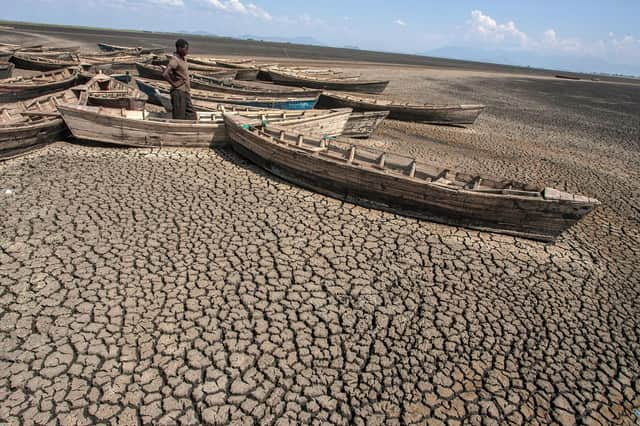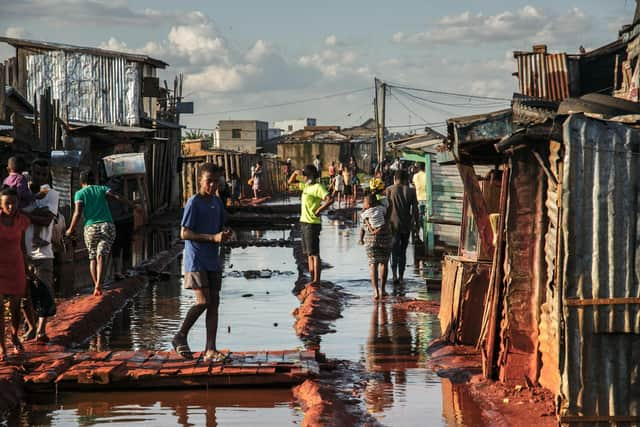As climate change and Ukraine War threaten food supplies in Malawi and other poor countries, UK must reverse its aid cuts – Patrick Watt


Christian Aid has worked in Malawi for the last 20 years, alongside our local partners, to empower marginalised communities as they find practical routes out of poverty. Our experience tells us those challenges are only becoming harder.
In January, Cyclone Ana devastated Malawi. To date, it is the world’s second deadliest weather event of 2022. Trees were toppled, roofs were ripped off buildings, and flash floods washed away roads and bridges.
Advertisement
Hide AdAdvertisement
Hide AdIt isn’t just the climate crisis that has hit Malawi. Food insecurity is endemic, affecting nearly four in ten people every year in the run-up to the harvest. This year is one of the worst on record.
The rise in global prices due to the war in Ukraine has added to the pressure. The price of necessities like cooking oil has shot up. The cost of bread has increased by 50 per cent in the last three months.
The head of the African Union, Macky Sall, rightly described African countries as the innocent victims of the war in Ukraine. Malawi’s capacity to take a hit is limited: half of the population are currently struggling on less than $1 a day.
In May, the Malawian government devalued the national currency, the kwacha, by 25 per cent as part of an attempt to secure financial assistance from the International Monetary Fund. Against this backdrop, one might expect the international community to step up.


Yet that support hasn’t been forthcoming. Last year, G7 leaders pledged $8.5 billion in the Famine Prevention Compact to end acute hunger and starvation.
A year on, hunger is rising and most of this sum hasn’t materialised. Last week, the United Nations’ World Food Programme warned of imminent disruption to food aid in Malawi, and other Southern African countries, because of funding shortfalls and rising food costs. The UK’s own support to the country has been cut drastically, by 60 per cent in the last two years.
Waiting for the worst-case scenario to unfold is unacceptable. We must not accept the false choice between responding to Ukraine and fulfilling our responsibilities to people in the poorest countries facing acute hunger.
Christian Aid takes that responsibility seriously. It is why we’re not only responding to hunger emergencies in parts of the world most affected by the current cost-of-living crisis but are also working to tackle its underlying causes. I saw some of this work first-hand during my recent visit to Malawi, where we are supporting smallholder farmers, most of them women, to get a fair price for their crops.
Advertisement
Hide AdAdvertisement
Hide AdTo take one example, our work with Nandolo Farmers’ Association in the south of the country is helping growers of pigeon peas to get their products to market, both in Malawi and in South Asia.
In principle, pigeon peas are the ideal drought-resistant crop for a climate vulnerable country, requiring little water or fertiliser. Yet a lack of access to improved varieties results in crop diseases and low yields, while export opportunities continue to be limited by high freight costs.
Christian Aid is training farmers on how to boost the quality of seeds and is helping them to form cooperatives and use warehouses that allow them to compete against large-scale producers, reduce exploitation by middlemen, and gain new markets.
We are also working to promote pigeon peas as an everyday food in Malawi, where they tend to be seen as “desperation food” that is only eaten during the lean season before harvest.
While in Lilongwe, I was able to launch a new recipe book with the Minister of Agriculture, which encourages new ways of consuming the peas, including as flour in a variety of familiar dishes.
For Frances Green, one of the growers working with the Nandolo Farmers Association, the support has helped her increase crop yield and her income. She told us how it had helped her achieve her dream of building a home for her family.
Work like this can create real hope in the face of increasing adversity. However, lasting change at scale also requires action by governments.
Malawi needs support – promised but for the most part not delivered – to adapt to the effects of climate change. It also needs compensation for the growing losses it faces from climate-related disasters like Cyclone Ana, building on the landmark commitment by the Scottish Government at the COP26 summit in Glasgow to establish a climate justice fund.
Advertisement
Hide AdAdvertisement
Hide AdThe Ukraine war, and the spiralling food and energy costs that it has triggered, underscores the need for a new approach to global food security, and a rapid phase-out of fossil fuels as part of a just transition to a net-zero global economy.
The UK Government, for its part, needs to reverse aid cuts to poor but stable countries like Malawi that have fallen off the political radar, and play its full part in tackling the increasingly unsustainable debt burden that threatens the future economic prospects of low-income countries.
Our world is confronted by interlocking crises – from the climate crisis to the war in Ukraine, to the economic aftershocks of the Covid pandemic. In responding to them, we face a choice as to the kind of world we want to live in, and the kind of society we want to be.
During times of stress, the truest test of whether we are building a fair and sustainable world is how we act towards people living in poverty, both at home and abroad. Scotland’s long-standing friendship with Malawi is a powerful example of that.
Patrick Watt is chief executive of Christian Aid
Comments
Want to join the conversation? Please or to comment on this article.
